INTERVIEW: FIRE & DUST MEETS
KATHRYN O’DRISCOLL
I lie down in a bath brim-filled with peonies
and feel their soft crush beneath my weight.
That soundless collapse of a teen girl.
The emptiness of discarded velvet dresses.
Pink blood blot tests me where I move,
my thigh is a map of a country in lockdown;
see how it doesn’t move but it can tremble.
This city is a bruise I keep pressing upon
so I dip myself under and ask the petals
to tell me their first memories.
Rain,
they say.
Rain.
___________–‘Peony-Bruised’, p.110
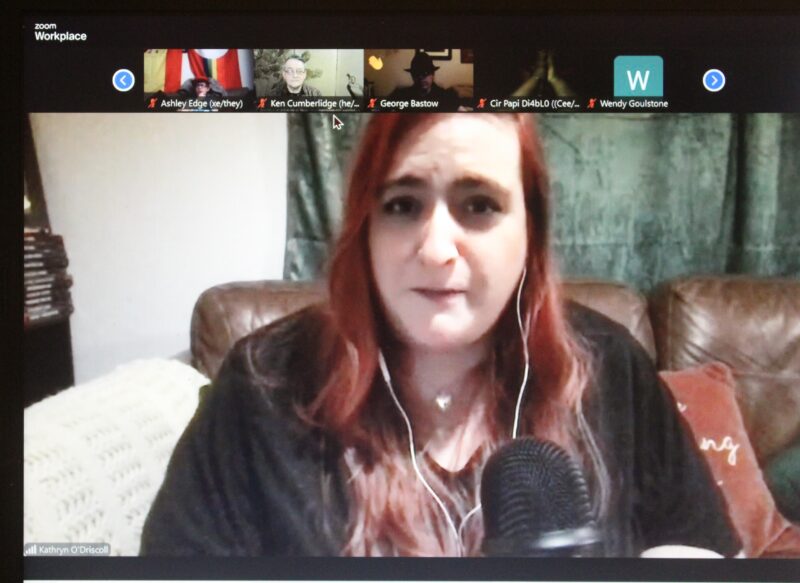
Kathryn O’Driscoll is a poet, mentor and editor from Bath, and the co-Founder of Bath’s spoken word event The Poetry Spa. Across Kathryn’s work, she talks openly about disabilities, mental health, LGBTQIA+ issues and joys. In 2021, she was the UK Poetry Slam Champion and a World Slam Finalist. That same year, she was one of the featured poets on the (BAFTA winning) Sky Arts spoken word TV show Life and Rhymes. She was longlisted for both the Outspoken Prize for Performance Poetry and the Saboteur Award for Best Spoken Word Artist in 2022, and for the Disabled Poets Prize 2023. Her debut collection Cliff Notes was released by Verve Poetry Press in 2022.
In May 2024, Kathryn was the guest headliner at our virtual Fire&Dust poetry night. We caught up with her after the gig, to ask a few questions…
HCE: Tell us a little about your background and journey as a writer so far. What inspired you to start creating and performing poetry?
KOD: Originally I started writing page poetry when I was around ten years old. I went to a Catholic school and we had had to write weekly prayers on a theme, and then the best one from each year group would be read on Friday at the school assembly and my prayers kept getting picked for that. And then they evolved into teaching us about poetry and I was hooked, haha. My mum has a huge love for literature and loved sharing things with me, and I quickly just got consumed by it and I used it to cope with the things happening in my life and my head. And then I went to Bath Spa University to study Creative Writing and they had a module on ‘performance poetry’ which I took to see if I could cope with it with my social anxiety disorder, and I fell in love with that too.
HCE: Do you have an ideal audience in mind when you’re putting a poem together?
KOD: Every few years I might find myself frustrated by something about my poetry career and I will recentre myself by remembering why I want to write in the first place, which is to help other people not feel alone. And so I think for me, my ideal audience is anyone who feels alone and who might benefit from hearing someone else share the dark bits. I often feel a pressure to ‘lighten up’ or create happier or more ‘inspirational’ works in order to be more bookable or promotable, but when I was in a really dark place, I wasn’t ready to relate to people who had gotten out of it the other side. And so that’s what I try to share. The ‘I’m not there yet, but things are better than they were’ part of a person’s journey that can feel never ending and so isolating.
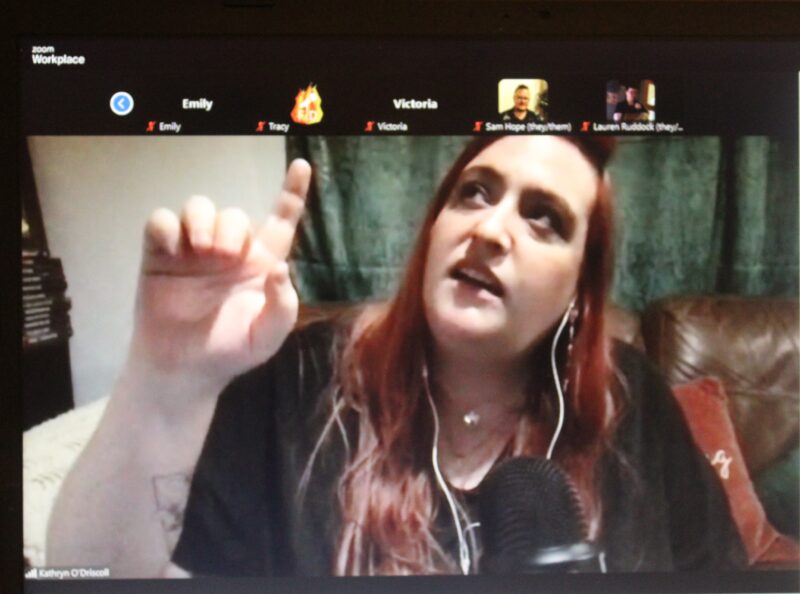
HCE: What have responses to Cliff Notes been like? Have readers connected with the material in ways you hoped they would?
KOD: People have been incredibly kind overall, but it’s a dark book, and I think it’s suffered a little by not having moments in it where people can catch their breath and enjoy it. I don’t think people go back to it multiple times. But that’s true to my experience. Unrelenting darkness reflects so many people’s struggles with mental illness and disability. During the process I found myself questioning the tone of it a lot, and then I read some insightful articles about the internalised ableism of the way that disability is consumed in the media. The way that people prefer it if we talk about what we have overcome, or the recovery aspects. But for me, I couldn’t leave my house at all for almost eight years. My journey was not a neat narrative arc. So I wanted my debut to be reflective of that truth. That for some people, getting better might feel impossible. Or it might take a lot longer than a couple of hundred pages to get to. I am hoping that one day I’ll have a book that’s the complete opposite of Cliff Notes, and it’ll feel like balance. But I’m not there yet, and I want my work to be authentic. So I made peace with having a book that feels true, rather than is universally loved.
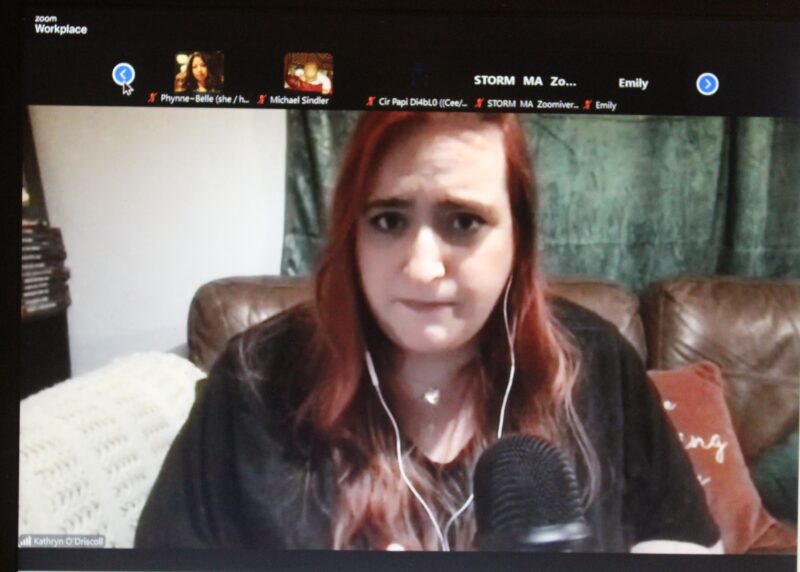
HCE: Many of your poems feature visceral imagery or elements of body horror. Can you talk us through your writing process a little – how do you ‘translate’ into poems the brutal life experiences that inspire you?
KOD: I honestly don’t know. This is something that evolved in my work slowly over decades and once I noticed it, I leaned into it. But I don’t know where it started or why. I have aphantasia so I can’t ‘see’ things in my mind’s eye, I can only have the sensation of them or a description of the moment of them… so, I think that makes it easier to translate things into other things (like a feeling into a visual) because they aren’t already anchored to something physical in my mind. Caroline Bird said during my mentorship for Cliff Notes that poetry can be ‘all truth, no facts’ and I leaned into that idea more heavily as I went through that process. The way things feel is as much the truth as whether or not those physical things that caused that pain happened. And I am acutely aware that my experience of the world is unique and it’s easier for someone to imagine a physical act than an emotional pain they might not have experienced. So the body became a vehicle for helping people imagine this experience in a way relatable to them.
HCE: Are there other themes or motifs that you tend to gravitate to in your work?
KOD: I find a lot of grief, rot, rivers, birds, water in general, darkness, light and decay in my poetry. God, that sounds lovely doesn’t it? But it’s true. I also see stages in my poetry. I have a huge back catalogue of poems (over a thousand) and when I look through them I can see – oh, here’s where I was re-reading Hamlet. Oh, here’s where I had a crush, oh here’s where my dog died… and I’ve gone through cycles of trying form, or speaking entirely in metaphors, or storytelling fictions based on a feeling. I seem to have settled in small, confessional, bleak little poems. But it’s not all I’ve ever written by any means.
HCE: What are some of your favourite poems in Cliff Notes, and why?
KOD: That’s a hard one. I think I have three favourites for different reasons. I think the one I love most that I wrote for Cliff Notes is ‘The Pit, The Core’. Because it is the kindest poem in the collection. It’s a poem I kind of wrote for myself, to tell myself: “sometimes you feel bad because things are bad, that’s not your fault.”… I love ‘A Letter to Parliament’ because it’s the poem that’s done the most for my career and one of the ones I feel most passionately about politically… and I love ‘Peony Bruised’ because it’s the most obvious (to me) examples of the light getting into those dark places.
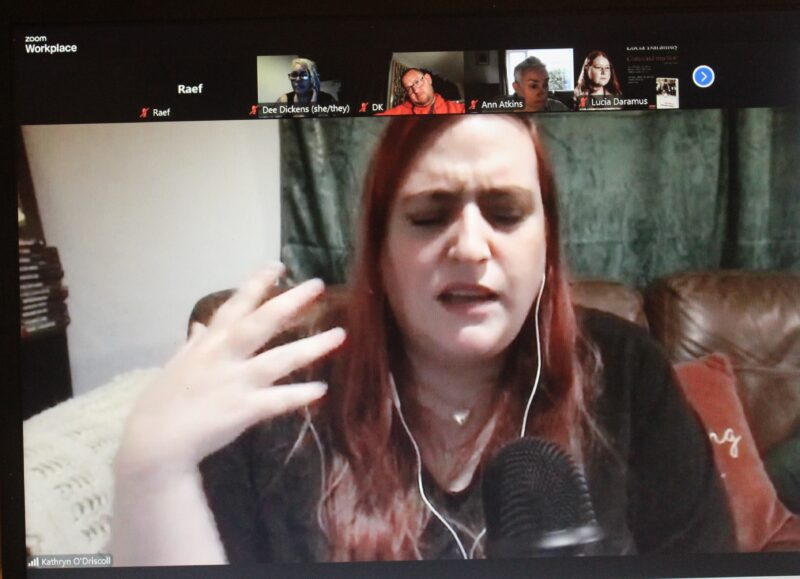
HCE: Much of your poetry explores the darker side of life, such as chronic illness, grief and suicidal ideation, in a raw and honest way – is this an emotionally draining thing to do? What is the top piece of advice you would give other poets for tackling heavy/personal topics in their writing?
KOD: I don’t find it draining to write about because I don’t sit down and think, right it’s four o’clock, time to write a poem. I am usually writing those first drafts as those things happen in my head. So the emotion itself drains me, not the recording of it… I think my top piece of advice is, don’t rush a poem. You don’t need to push a poem, it will come when it’s ready. Some of the worse things that I’ve been through, it took 15 years to write it down. And when I did, it still was a perfect record of how that thing felt despite that distance in time. And it still helped other people going through a similar thing… there’s a preconceived notion, in slam in particular, that the biggest trauma wins a slam. It’s not true at a national level for sure. And even if it was true, your health is more important than any slam. You cannot build your career if you destroy yourself along the way. So take care of yourself, and don’t write about the things that don’t feel ready to be written about… and equally, you don’t have to share everything you write. So if you need to write about something that happened, think about whether or not that piece is the right piece to put out into the world about that event.
HCE: You have an excellent track record when it comes to performing in slams! How did it feel being named the UK Slam Poetry Champion in 2021, and what was it like being a finalist in the World Poetry Slam? Do you still enjoy that competitive side of the spoken word scene?
KOD: Both of those things were wild to me because they happened during Covid, so both happened in my house (as far as my experience of it). So I won the title, closed my laptop, and danced around the kitchen with my fiancée and my dog, and then I went to sleep. I didn’t really get to celebrate or feel like it was a big deal. I regret that. I also didn’t get to do, like, a victory tour of events or anything. Because my partner was shielding and we were still being super cautious. And now my time has passed and I sometimes wish I could do it all again just to be able to go to Paris or do a little tour… but nonetheless, it was still a massive, massive honour and one that part of me still doesn’t believe I deserve. I still really struggle with it. I am lucky, in a lot of ways, that in both competitions there were many artists that I have huge respect for, so that I can remind myself that I really worked hard to beat these amazing poets who I see as much more talented than me… haha… and I still love slam but I don’t really feel the same comradery that I used to. People seem wary when I’m there, and I don’t blame them for that, but there are lots of local slams I never won and I think I missed that window… I am transitioning now into judging more, which I also love because I have studied spoken word academically so I am able to really analyse poems even if they’re a style or subject matter I don’t relate to. I think that’s something people don’t really know about me but I have loved being a judge of Nationals for the past three years, it’s immense fun and feels good to give back.
HCE: Any top tips for open mic poets planning to venture into the world of slams? Is it a strange transition at first?
KOD: Any poem can be in a slam, as long as it’s under three minutes. Don’t get caught up in the idea that there is a slam style, or that certain subjects win… a good set of judges can identify what techniques are used to support your meaning, and how well you’ve done that. So write what you love, share what you love, and remember that slams are just a gimmick to trick audiences into listening to poetry. If you think of it as 3 minutes of free time, that people HAVE to listen to you, then at the very worst, even if you come dead last, you win. Because you get a platform to use your voice as an artist. I’ve been in the finals of slams and not known which poems to do to win, and decided to do a poem that is unlikely to win because I want to utilise the platform in front of that large audience in a way that might have a lasting impact… and that feels amazing, whether you win or not.
HCE: Is there a difference, in your opinion, between poems that are good candidates for ‘the stage’ and poems that work well on ‘the page’?
KOD: I think there are poems that only work one way or another, but a lot of poems can do both. But when I’m teaching about spoken word I talk about how spoken word poems only exist in the performance of them, and the written version of them is just like a record of the actual poem (the performance) and it is not itself the poem. Just like a page poem has white space, punctuation, form, a title, all these things that contribute to how a reader experiences it, so does a performance poem. Your breath, volume, your body language, the stage, the poem the audience just heard before it, these are all things that affect how someone receives what you give them. So you can translate some things to the other format (like white space might become pauses for example) but some things aren’t translatable. Some page poems you need to re-read them once the final line has unlocked its meaning, which wouldn’t work on stage when you only hear a poem once. Some stage poems – like Raymond Antrobus’ Two Guns in the Sky for Daniel Harris – wouldn’t mean the same on the page. So whilst lots of poems can do both, there are some that work best one way or another and that’s totally fine. For me, I get a sense of what a poem is as I’m writing it. I don’t tend to think ‘I’m going to write a slam poem’. A poem begins and I get a sense of it, and then tailor how I write it for how I’m going to give it to a reader / listener.
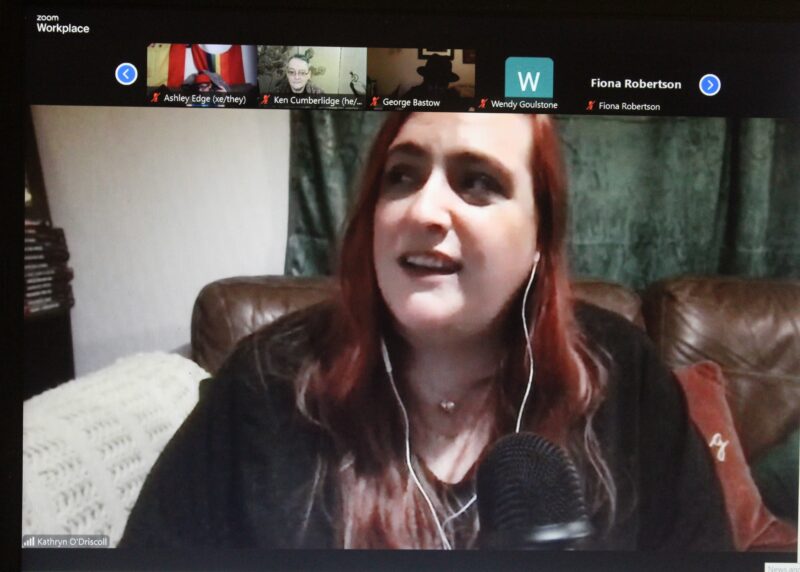
HCE: How do you think arts communities could do more to support poets with a complex range of disabilities, to make sure their voices are platformed and heard?
KOD: Blimey. That’s a big question. I think Apples and Snakes have been doing a lot of great work around Access Riders, trying to encourage artists to have them, and organisations to ask for them, and I think that’ll make a big difference to a lot of people… I think that we all need to question our internal biases towards everything always. I was shocked, writing Cliff Notes, to realise that my desire for it to end on a happy note was internalised ableism and a response to the way that disability is more acceptable when it comes in that inspirational tone… and I think I’m quite aware of ableism so I think everyone checking in on themselves and why they think what they think, why they like the art they like, can help a lot… but generally I think that the poetry community is in desperate need of a collective movement towards higher priced events (with concessions of course). Especially since Covid, it’s increasingly difficult to get accessible venues for free, but no one can put their prices up to account for the cost of access needs because we are all undercharging (compared to the music live events scene). I don’t see how that can change, so I don’t see how the cost of access can ever be a community priority. And that feels really sad. Especially as someone who is working-class, on benefits, and disabled. I don’t want the price of events to go up…. But I’d rather go to fewer events and know that all events are accessible to everyone personally, and I think having a higher price, with no-questions-asked concessions is the only solution I have thought of so far – but it would require everyone to do it and that’s not possible either.
HCE: What type of poetry do you seek out for personal enjoyment? As a reader/listener, when you engage with a poet’s work, what are you hoping to get out of it?
KOD: I think I like a really wide range of poetry but the poets who I think about their poems long after are usually writing on themes that I connect to. People like Jasmine Gardosi, Joelle Taylor, Shane Koyczan, Dee Dickens, Emma Taylor, Ellie Jenkins, Raina Greifer, Lauren Ruddock, Vron McIntyre… I feel like they are all facing the darkness and not flinching… and so I think that’s why they linger in my heart and mind.
HCE: What’s next on the horizon for you? Are you already working on a new project/booked for upcoming performances?
KOD: Up next, well on June 7th I’m performing at Satellite of Love in Bristol in support of Jemma Hathaway’s launch of her book ‘I’ve Been Looking Everywhere For You’, which I am so excited for! And then overall I am working on a new pamphlet… I have had my eye on a publisher I really want to work with and they have an open call in October so I am trying to work out which of my ideas to follow through on. I really wanted to write a happier pamphlet (because it’ll be my first pamphlet because Cliff Notes was a full collection) but so far the themes emerging are neurodivergence, grief and chronic illness… I am seeing cracks of light through some of those topics due to some amazing chronically-ill friends so I think that whatever comes next will be lighter than Cliff Notes, but I don’t think it’ll be sunshine just yet!
HCE: What’s the best way for people to keep connected with you and your work, or contact you for bookings?
HCE: Is there anything we didn’t cover that you’d like to share with our readers?
KOD: Just that they should go to Fire&Dust because it’s such a warm (pun intended) and gorgeous event – and thanks for having me!
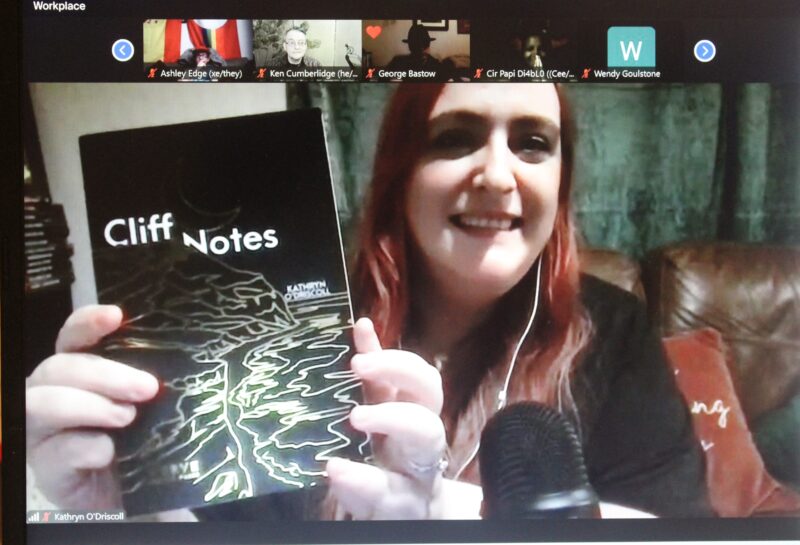
Kathryn’s collection Cliff Notes is available online direct from Kathryn’s website (signed/unsigned), as well as from publisher Verve and other bookshops and retailers.
